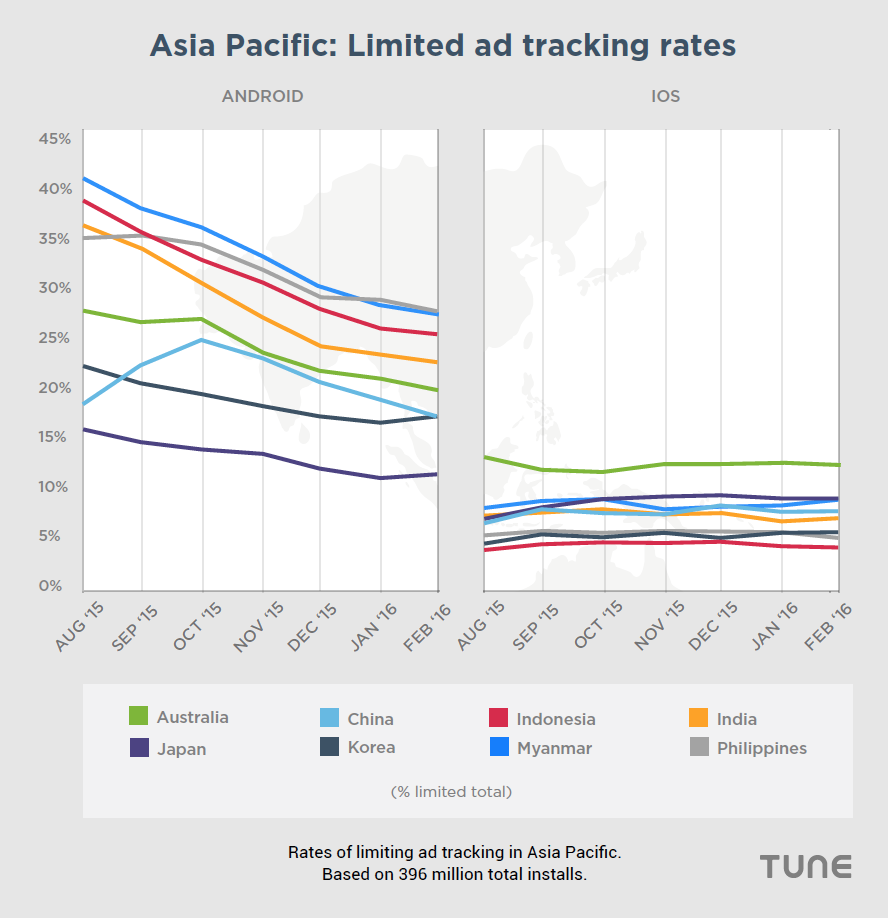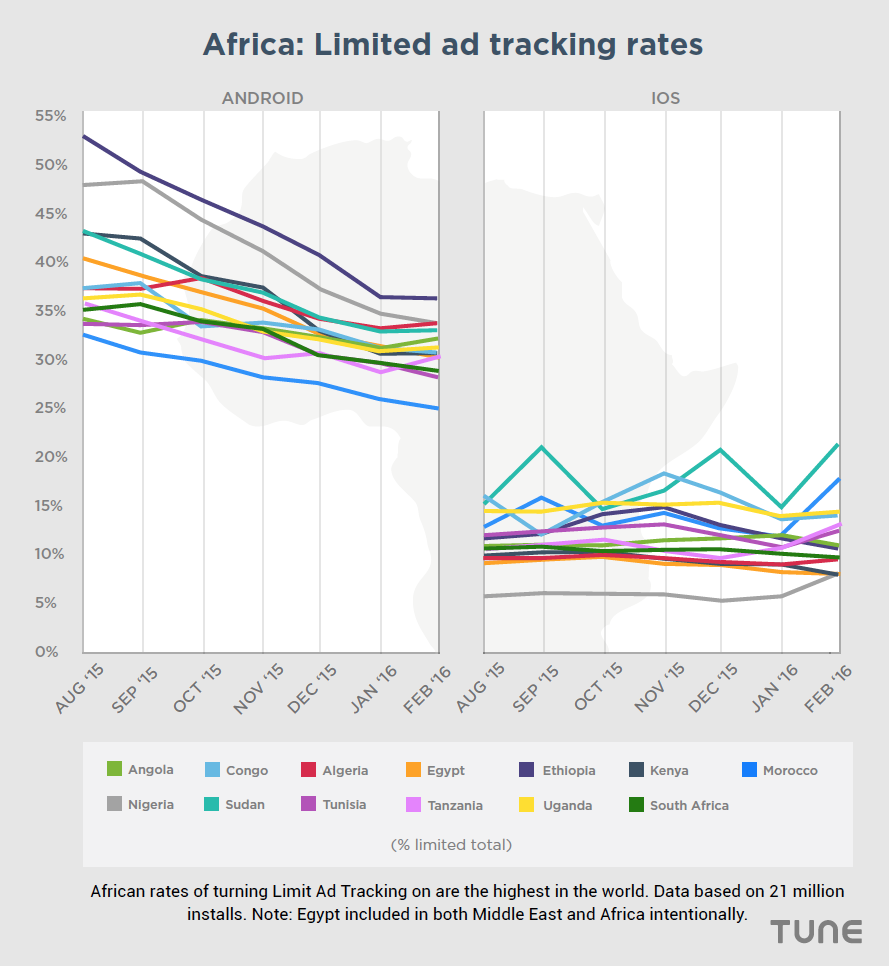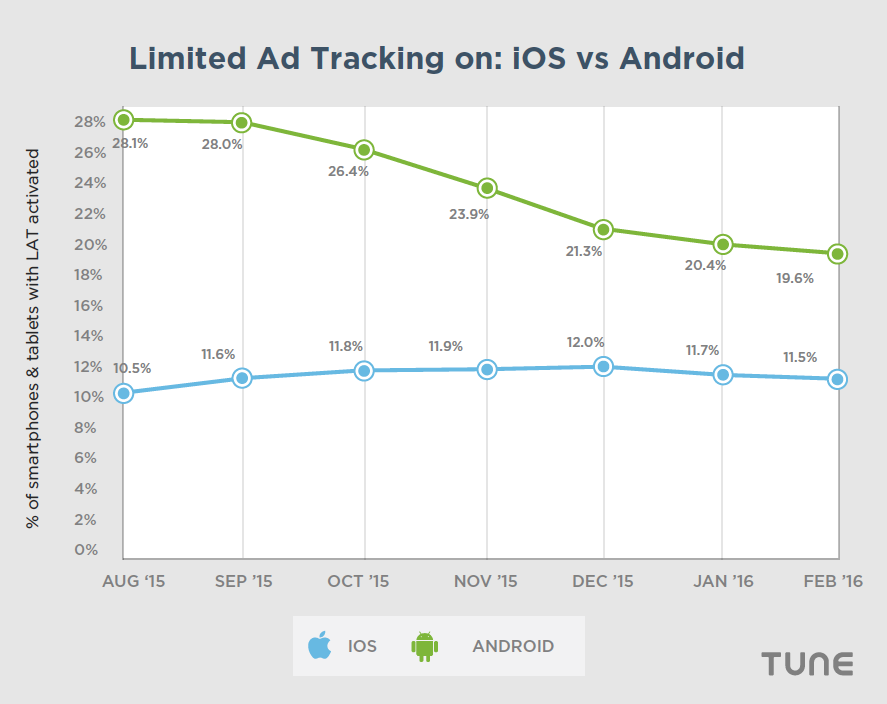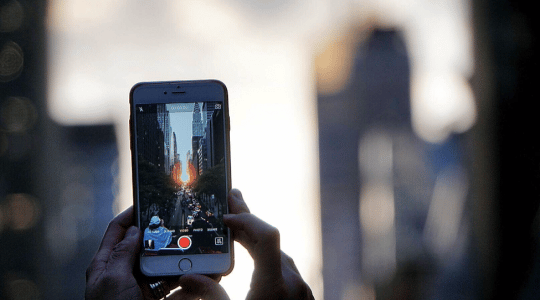People are more trusting and open today than they ever have been before. At least, when it comes to mobile privacy. And, I should add, in all but one country.
Hint: it’s not in Europe or North America.
Earlier this year I conducted a study for TUNE on privacy. One of our founders had noticed something interesting in the data we see — 400,000 GBs last year, with over a billion ad clicks in 16 categories — around an obscure setting for limiting data sharing with advertisers. On iOS, it’s called Limit Ad Tracking. On Android, it’s in settings under Ads, and labeled “Opt out of interest-based ads.”

Use of limiting ad tracking is dropping on Android in APAC, just like almost every region on the planet
We ended up studying data on 1.3 billion installs by about 150 million people in over 200 countries. And usage of the setting, which indicates how private people want to be on the most personal computing device in history, dropped rapidly over the seven months of data collection ending in February 2016.
When smartphone owners activate limit ad tracking, they limit the amount of information advertisers can legitimately use about their viewing and interaction of ads. When the setting is off, for instance, advertisers can tailor ads to what they think you might like based on a profile built up by your behavior over time.
(It’s important to note that this targeting is not personal or individual, but focused on a demographic group that you might get assigned to based on the apps you use, your location, topics you seem interested in, and so on—often referred to as behavioral targeting.)
The most privacy-conscious people on the planet tend to live in less-developed economies. For instance, Egyptians began the 7-month study period at 40.5% on Android, and ended at 30.5%. Nigeria started at 48.5% and ended at 34%. Myanmar data showed a similar drift from 41% to 27%. By contrast, Japanese slid from and already-low 16% to 12%, Koreans from 22.5% to 17.5%, and Americans from 23% to 15%.
Given the legislative differences between Europe and the U.S., you might expect Europeans to be significantly higher than Americans in terms of digital privacy on their smartphones. And while they are to a degree, the difference is not as significant you might expect.
Germans decreased their opt-out of ad tracking from 29% to 20%, Russians from 33% to 27%, and both the Swedes and English dropped from about 30% to 19% … just four percentage points above Americans.
At 12% on Android, Japan turns out to be the least privacy-conscious smartphone nation on the planet, just a few points below the U.S. and Canada.
For iOS, limiting ad tracking has always been less popular than on Android, with global numbers in the 10-12% range that held steady across the entire course of the study. Interestingly, however, the lowest percentage we found anywhere on the planet was iPhone-using Mexicans, who only activated limit ad tracking in 6.5% of cases across the board. And that percentage was flat across all seven months of the study.
There was one nation where the use of ad tracking opt-outs increased, and that was in South America.
Venezuela started the seven-month study at 18% on Android, and finished it at 19% … the only country where we saw an increase in the 200 we had data for.
Interested in the full details?
The entire study, with data charts and graphs, is available for free.
_ _ _ _
This post is based on three research reports, all available free from TUNE:
- Ad Blocking App Installs Just Spiked 3X (Here’s What Marketers Need to Know)
- Ads, Tracking, and Privacy: What 1.3B App Installs say about Smartphones and Tracking
- Mobile Ad Blocking: Consumers Won’t Pay Even $1/year to Skip Ads
Author
Before acting as a mobile economist for TUNE, John built the VB Insight research team at VentureBeat and managed teams creating software for partners like Intel and Disney. In addition, he led technical teams, built social sites and mobile apps, and consulted on mobile, social, and IoT. In 2014, he was named to Folio's top 100 of the media industry's "most innovative entrepreneurs and market shaker-uppers." John lives in British Columbia, Canada with his family, where he coaches baseball and hockey, though not at the same time.






I wonder if users are not restricting ad tracking more directly correlates to the use of ad blocking. They may not feel they have as strong of a need to enable the setting if they’re already blocking ads.